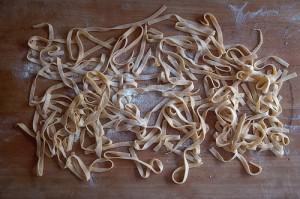 I was washing dishes the other day and bemoaning how time consuming it was. This sparked one of those internal conversations that seem to dominate my thoughts when doing mindless chores. “How much time would I spend going to a restaurant, not to mention money, to have a meal prepared that may or may not be worth it? Is cooking food and cleaning up after myself worth the effort?” The second to last rule (#63) in Michael Pollan’s Food Rules is “Cook.” Pollan makes the argument that obesity is in part related to not cooking for one’s self since you can’t control what goes into the meal. Additionally, the portion sizes at restaurant are often quite large. As a positive, it can be enjoyable to cook, assuming it doesn’t turn out like the schlock from Worst Cooks in America.
I was washing dishes the other day and bemoaning how time consuming it was. This sparked one of those internal conversations that seem to dominate my thoughts when doing mindless chores. “How much time would I spend going to a restaurant, not to mention money, to have a meal prepared that may or may not be worth it? Is cooking food and cleaning up after myself worth the effort?” The second to last rule (#63) in Michael Pollan’s Food Rules is “Cook.” Pollan makes the argument that obesity is in part related to not cooking for one’s self since you can’t control what goes into the meal. Additionally, the portion sizes at restaurant are often quite large. As a positive, it can be enjoyable to cook, assuming it doesn’t turn out like the schlock from Worst Cooks in America.
The clean-up aside, the act of taking raw ingredients and crafting something is unrivaled (much like working with ones hands). The process can be lengthy, but it is important to connect with your food. I don’t mean emotionally, but rather to understand how something like ground beef can be turned into meatloaf. Recently I’ve started trying to make my own pasta. The freshness and surprising ease is only part of the benefit. It costs no more, and often less, than dried store bought noodles. Buying dried black beans in bulk is another example. It is both economical and healthy. I control how much salt or flavor goes into the beans, and it doesn’t require preservatives. However, it takes a lot longer than popping open a can of beans that cost $1.29. This is the trade-off, perhaps: the slowing down of the frenetic pace we have come to accept, especially in industrialized nations, as a part of life.
The whole premise of cooking for ones self emanates from Slow Food, which has been around for sometime, gaining popularity over the past decade. In reality it is probably the original “food movement.” Founded in Italy more than 20 years ago, the movement “stands at the crossroads of ecology and gastronomy, ethics and pleasure. . . . Our association believes in the concept of neo-gastronomy – recognition of the strong connections between plate, planet, people and culture.” It is this last point that is of particular interest given the mission and theme of this site. Connecting with your food is often seen as a luxury afforded the wealth and hoighty-toighty. The problem is, everyone needs to access fresh, healthy food. This was the whole premise behind Jaime Oliver’s Food Revolution. In fact, it was from watching a cooking show of Jaime Oliver’s that I first came across making pasta by hand.
This post serves as a follow up to an op-ed earlier this year in which I discussed the benefits of face-to-face communication. It is important that we take time to make our own food, know what goes into it, and realize that we can make a better meal than most run-of-the-mill restaurants. Look, I’m not a great cook, but the pleasure derived from making my own ice cream or pasta far exceeds the feeling I get after eating somewhere that doesn’t put in the time and effort to make my meal. For those that can afford it (and can’t cook), Sander Daniels from Thumback.com sent along an interesting suggestion: “Hire a cook.” While the suggestion referred to the office setting, it goes to show how a made from scratch meal is an investment in community and health.
[Image source]

